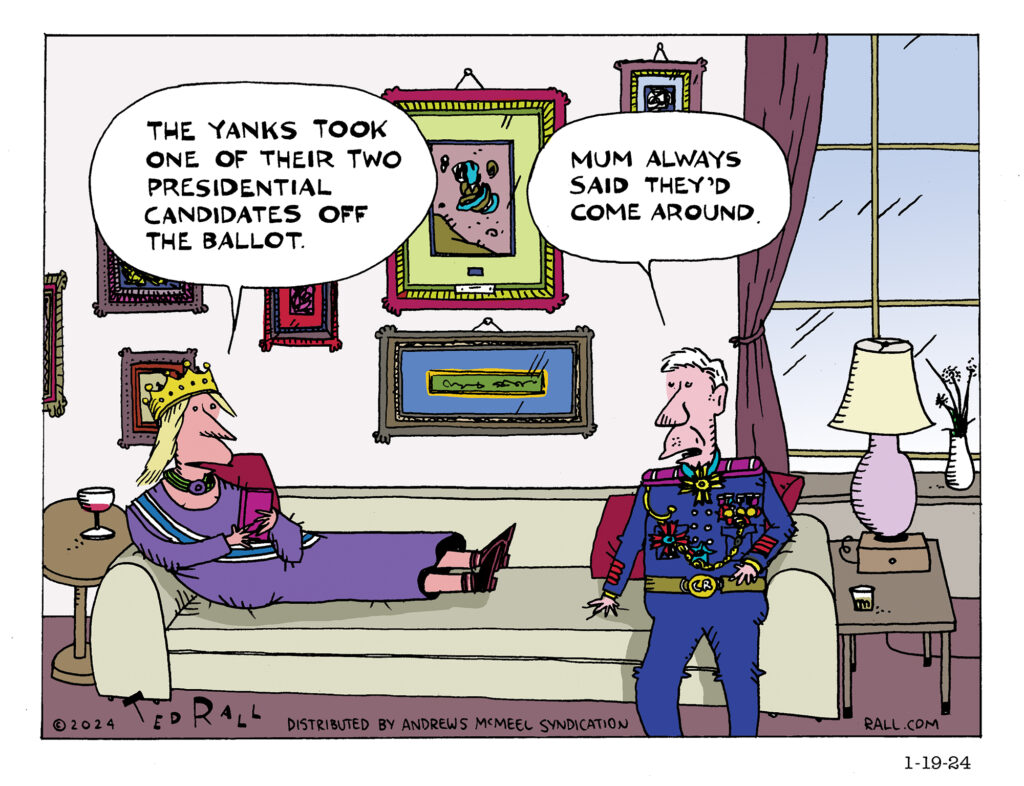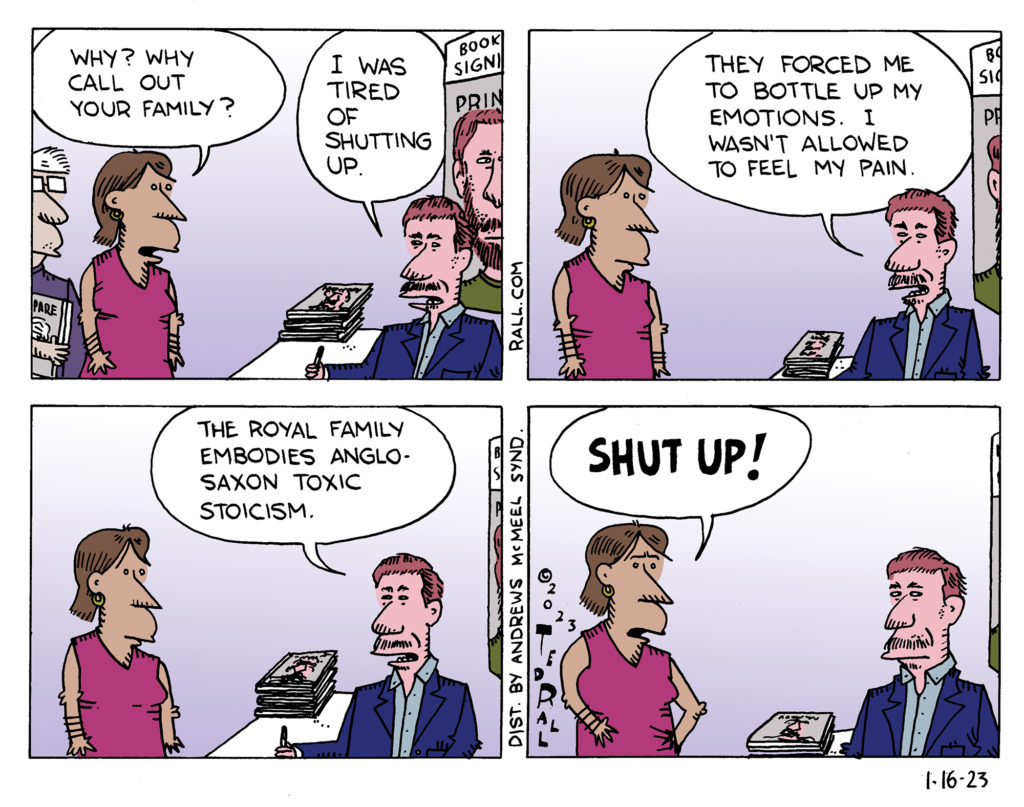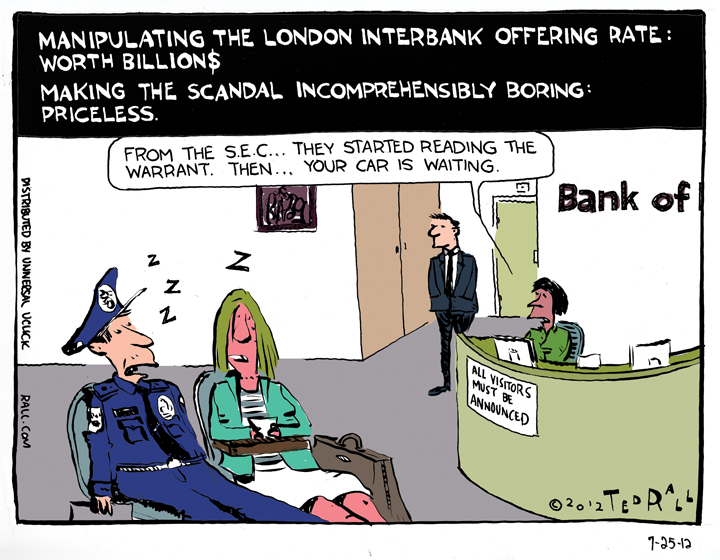The Supreme Court has been asked to determine whether Donald Trump can be removed from the ballot under the 14th Amendment. In a two-party system, there will be implications.
DMZ America Podcast 73: Ukraine War, British Pipeline Shenanigans and Midterms Prognostications
Leftie cartoonist Ted Rall and rightie cartoonist Scott Stantis file their last analysis and handicap before the 2022 midterm elections, both in agreement that things currently bleak for Democrats. Evidence surfaces implicating the British Navy in the bombing of the Nordstream 2 gas pipeline. Congressional progressive Democrats are humiliated by having to withdraw their tepid call for diplomacy between Ukraine and Russia. Speculation abounds surrounding the brutal hammer attack against Nancy Pelosi’s husband in their San Francisco home.
Sometimes What a Van Gogh Needs Is a Splash of Tomato Soup

From The Washington Post: “Just after 11 a.m. on Friday morning, two young climate protesters entered a room in the National Gallery in London containing one of Vincent van Gogh’s most famous paintings: ‘Sunflowers.’ They opened two cans of Heinz tomato soup, flung them on the painting, then glued their hands to the wall.”
Phoebe Plummer of the Just Stop Oil movement, 21, shouted: “What is worth more, art or life?” She continued: “Are you more concerned about the protection of a painting or the protection of our planet?”
If you didn’t follow this story, you can easily imagine the response of many liberals: this action was stupid. Vincent Van Gogh had nothing to do with global warming. It’s counterproductive. It’s going to turn off people against the environmental movement. Liberals, who claim to care deeply about climate change, similarly deplored the group’s disruption of traffic and sporting events.
“They sure know how to get attention. And while their passion is admirable, their tactics are repugnant,” said Mother Jones magazine editor Michael Mechanic. “All you did was anger the very people you’re trying to appeal to,” tweeted American comic book artist Jamal Igle. “Attacking Van Gogh’s Sunflowers—one of the world’s most loved paintings—will not gain public support, which is what is needed for real change,” said art historian Ruth Millington.
It is largely forgotten that Van Gogh was a populist and a Marxist. Odds are, he would have approved of this attempt to raise awareness of the climate crisis.
There was no damage to the painting, which was protected by a sheet of glass. The incident nevertheless reminded me of the discussion over the 2001 dynamiting of the giant Buddha statues at Bamian, Afghanistan, which prompted global outrage. The Taliban government, which had previously protected the statues, reversed course when a Swedish delegation along with UNESCO traveled to Afghanistan and offered money to buy and preserve the 1400-year-old sandstone relics at a time that the country was reeling under the weight of Western sanctions. Meanwhile, requests for medical and food assistance for living, breathing flesh-and-blood human beings fell on deaf ears.
Sayed Rahmatullah Hashemi, an adviser to Taliban leader Mullah Muhammad Omar explained, “[Our] scholars told them that instead of spending money on statues, why didn’t they help our children who are dying of malnutrition? They rejected that, saying, ‘This money is only for statues.’” Incensed, the Taliban decided to blow up the Buddhas to express their outrage. “If money is going to statues while children are dying of malnutrition next door, then that makes it harmful, and we destroy it,” Rahmatullah said.
I wouldn’t have detonated the charge to blow up those statues. I’m too much of a history geek. But I saw Rahmatullah’s point. Sometimes the world needs a slap across its face to force it to pay attention.
My first reaction to the Just Stop Oil action was: what good is a painting that no one will be around to see in 50 years?
Then—and that’s where I am now—I thought, good for them. Radically mitigating climate change should be humanity’s top priority. 69% of all animals on earth died between 1970 and 2018. Since 1900, birds, mammals, reptiles, amphibians and fish species have died 72 times faster than “normal.” Droughts are severe. Storms are getting more violent. This isn’t an emergency. It’s THE emergency.
But international organizations aren’t doing anything, because the politicians who belong to them prioritize profits over the planet. Capitalism rules, so the politicians aren’t doing anything. (Reducing greenhouse gas emissions by half by 2030, as Biden promises, is so not going to happen that it’s hardly worth mentioning.) Citizens don’t understand how awful the situation is, or they feel alone in their understanding, so they’re aren’t doing anything.
We aren’t engaged in sustained protest. We aren’t rioting. We aren’t overthrowing our do-nothing governments. We aren’t even voting against politicians who aren’t doing anything. Here in the United States, only the Green Party cares about climate change—and their votes amount to a rounding error. And the media hardly ever talks about it.
Truly, it’s the ultimate madness. The house is on fire, flames all around, and we’re not even calling 911, much less reaching for a bucket of water. We are all going to die, or if we’re old our children will, yet we remain oblivious, passive, resigned, disconnected, alienated, stupid—for no reason. 99.9% of humanity does not own energy stocks and we’re all willing to die for the tiny minority who do.
So what if the Just Stop Oil activists bum out art lovers? If your blood boils over what they did more than it does over what they’re talking about, you’re too dumb to be won over in the first place. Complacency kills; outrage fights complacency.
Pardon the young people who kinda-sort-of desecrate Van Goghs. For they may or may not know what they’re doing but they certainly know what’s important. If we’re all going to die for no good reason, some of us have the right to go out screaming.
(Ted Rall (Twitter: @tedrall), the political cartoonist, columnist and graphic novelist, co-hosts the left-vs-right DMZ America podcast with fellow cartoonist Scott Stantis. You can support Ted’s hard-hitting political cartoons and columns and see his work first by sponsoring his work on Patreon.)
SYNDICATED COLUMN: Who’s Really To Blame for Brexit (and Trump)
 At this writing, securities markets and the international community are reeling at the news that British voters have opted to leave the European Union. The “Brexit” has provoked angry reactions from the pro-Remain camp, who accuse Leave voters of stupidity, shortsighted ignorance and, worse, thinly-disguised racism and nativism posing as nationalism.
At this writing, securities markets and the international community are reeling at the news that British voters have opted to leave the European Union. The “Brexit” has provoked angry reactions from the pro-Remain camp, who accuse Leave voters of stupidity, shortsighted ignorance and, worse, thinly-disguised racism and nativism posing as nationalism.
Political analysts point out that British voters were divided geographically – Scotland wanted to stay, England wanted to leave – as well as demographically. One chart that managed to go semi-viral online displayed high support for the Brexit among older voters, opposition among the young, alongside the actuarial average years remaining that each age group would have to live with the consequences of the vote. The smartest of these pundits focus on the class divide between shiny expensive youth-oriented cities like London, where pro-European sentiments are strong, and England’s version of the Rust Belt, abandoned hellholes where citizens barely subsist in a ruined landscape of shut down factories and widespread unemployment.
“If you’ve got money, you vote in,” a voter in Manchester told The Guardian. “If you haven’t got money, you vote out,” she said.
Amid all the concern about a collapsing British pound and the possible dissolution of not only the European Union – looks like France and the Netherlands may have a similar plebiscite in the near future – but also the United Kingdom, everyone’s out to cast blame. However, no one is pointing at those who are most responsible if (and it’s far from certain) Brexit leads to an economic downturn and/or a political debacle: the West’s incompetent political class, and its idiotic enablers in the corporate media.
The postwar order began to fray during the 1970s, when business leaders and their allies in government started to push aggressively for policies that encouraged the transfer of manufacturing industries to the developing world away from what was then called the First World in preparation for what we now call the information economy. Globalization is the shorthand term for deindustrialization – some call it outsourcing, others prefer the simpler “shipping jobs overseas” – and digitalization of culture and intellectual property.
This essay isn’t about whether globalization is good or bad. It’s about the way a trend that has been consistently declared irreversible has been poorly managed. That mismanagement led to the Brexit, and may elect Donald Trump.
Even during the 1970s, globalization’s downward pressure on wages was easy to foresee. Capital was becoming increasingly fluid, crossing borders with incredible ease in search of places and people where the production of goods and services could be done as cheaply as possible. If you own a factory in Michigan, and you can figure out a way to transport your product to market at reasonable cost, doing the patriotic “made in USA” thing feels like leaving money on the table when you consider what your expenses would look like in Vietnam or Indonesia.
Workers, on the other hand, are confined by international borders, linguistic and cultural limitations, family ties, and just plain inertia, to the nations — and often the regions within those countries — where they were born. If the highest wages in the world are paid in the United Arab Emirates, you can’t just hop on a plane and expect to find a job, much less a work permit. Workers are stuck; capital moves freely. This economic imbalance between labor and management is a significant contributing factor to the decline in real median wages in countries like Great Britain and the United States since the 1970s.
Now let’s say that you’re a high-ranking member of the ruling class: a Fortune 500 CEO, a head of state, a congressman, the publisher of a big-city newspaper. You don’t need a major in history or political science in order to anticipate that subjecting tens of millions of people to long-term unemployment and underemployment is a recipe for social dysfunction and the kind of class resentment that can be exploited by a demagogue or radical populist movement.
You can do one of two things with that knowledge. You can ignore victims of economic dislocation. Or you can help them.
If you ignore them, if you greedily grab up every dollar and pound and euro you can while city after city slowly collapses into alcoholism, drug abuse and rising crime, you know you’re setting yourself up for a future of political instability. It may take a long time, but the chickens will come home to roost. When things turn ugly, it could cost you a pile of cash you amassed during your orgy of greed.
That’s what happened during the 1980s, when Margaret Thatcher and Ronald Reagan dismantled the post-World War II social safety nets. Precisely at a time when the UK and the US needed more welfare, national healthcare and public education programs, they slashed them instead. Those austerity policies continued under Tony Blair, Bill Clinton, David Cameron, and – against reason and common sense – under Barack Obama after the 2008 economic meltdown.
The British and American political classes made a conscious decision over the last 40 to 50 years not to lift a finger to help those who lost their jobs to deindustrialization and globalization. Go back to college, they say. Get retrained. But most Americans can’t afford college tuition — the jobless least of all! We need(ed) a GI Bill for the dispossessed.
Even this week, many establishment types continue to criticize aging pensioners and unemployed workers over age 50, denigrating them as selfish, clueless, unwilling and unable to adapt themselves to the new – brutal – world in which we find ourselves.
No doubt: nativism and racism played a role in the Brexit vote. England is an island nation with an island mentality. Though only a few thousand Syrians entered the UK last year, with nary a passport check, images of refugees riding the roof of trains from France through the Chunnel felt like an invasion to some Britons. But bigotry shouldn’t let us ignore the economic factor. When jobs are plentiful and salaries are rising, no one minds immigration. Xenophobia grows in the soil of scarcity.
What did the elites think? Did they really believe it was possible to make so many people so desperate and so angry for so long without a risk of them lashing out?
Donald Trump is not a brilliant man. But the political classes could learn a lesson from him. He knows that an awful lot of people are angry. And he knows why.
(Ted Rall is the author of “Bernie,” a biography written with the cooperation of Democratic presidential candidate Bernie Sanders. His next book, the graphic biography “Trump,” comes out July 19th and is now available for pre-order.)
Babies With Three Parents: What UK Approval Really Means
Originally published at ANewDomain.net:
Everyone knows how the political system works. Whenever there is a pressing need for legislative action, the politicians do nothing at all. Either that, or they wait until lots of people die, then enact laws that half-fix the problem, usually making things worse.
A case of the former in the United States: climate change. Not only has U.S. Congress failed to act, but the political party that controls both houses of Congress won’t even admit that the problem exists. An example of the latter is healthcare. Tens of thousands of Americans have been dying every year because they can’t afford to see a doctor, so finally the United States joined the rest of the world by passing a national healthcare system, a.k.a. Obamacare, which may mark the first time in history that the US government has charged poor people a fine for refusing to buy a service.
We know that this is not a good system.
But it is the system that America, like most other countries, has always had. In the same way that people who live near rhinos know that they may get stomped by one of the armored creatures on a rampage, Americans are accustomed to the dysfunction of their political system. While it might be too much to say that we like to pay a substantial share of our income in taxes to support a government that either ignores our needs and desires, or messes things up even worse when it pays attention to them, no one expects this to change anytime soon.
As with the sun rising in the east, this is our reality.
Which is why the latest news from Great Britain makes our selective heads hurt.
“Britain’s House of Commons gave preliminary approval Tuesday to permitting scientists to create babies from the DNA of three people, a technique that could protect some children from inheriting potentially fatal diseases from their mothers,” reports the Associated Press.
Whaaaaaaaa—?
Did you know it was possible to make kids out of three people’s DNA?
No. Bet you didn’t.
How do I know? Because I didn’t. And I’m a double nerd: I read all the news and I’m especially interested in science. If there’s a weird story about science, and anyone has heard about it, it’s me.
Pretty freaky stuff. But that’s not the point here. The point is, Britain’s political system – which is even older than ours – is legalizing something that most people haven’t even heard of, much less been able to form an opinion about.
So far along are the Brits with this whole three-parent thing that their ethicists are publicly expressing a concern that this will open the door to eugenics on a grand scale, so-called “designer babies” whose genetic makeup would be predetermined by parents taking off a checklist of yesses and nos.
“The technique involves removing the nucleus DNA from the egg of a prospective mother and inserting it into a donor egg from which the nucleus DNA has been removed. This can be done before or after fertilization. The resulting embryo would have the nucleus DNA from its parents but the mitochondrial DNA from the donor. Scientists say the DNA from the donor egg amounts to less than 1 percent of the resulting embryo’s genes,” says the AP.
Whoa.
If 50 percent of Americans can define the word “mitochondria,” I will eat a garden slug. Hell, if 50 percent of American Congressmen were aware of this technique before today’s news, I’ll eat two.
I find it deeply distressing that there is an actual nation, much less one which kind of speaks English as one of its major languages, whose elected representatives (a) know anything about science, (b) know something about science before I do, and (c) have absorbed that knowledge so thoroughly that they are ready to propose, debate and actually pass a law in response to their scientific knowledge.
Forget Sputnik.
America is over.
Spaced Out
Possible GOP Presidential candidate Marco Rubio, whose father entered the US illegally, says the US is full up, that there just isn’t any room left in the US for new immigrants, including the children arriving at the border with Mexico. But when you actually consider how much space there is in the country, that’s obviously untrue.






